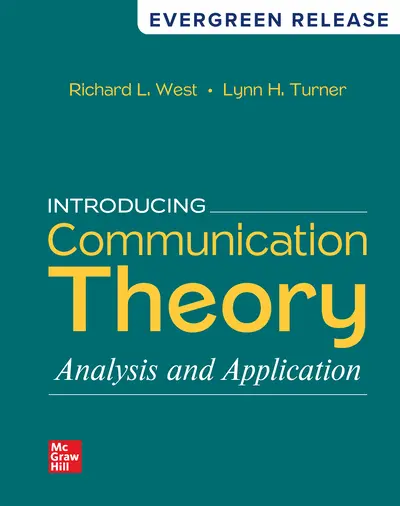My Account Details

ISBN10: 1266548718 | ISBN13: 9781266548710

* The estimated amount of time this product will be on the market is based on a number of factors, including faculty input to instructional design and the prior revision cycle and updates to academic research-which typically results in a revision cycle ranging from every two to four years for this product. Pricing subject to change at any time.
Instructor Information
Quick Actions (Only for Validated Instructor Accounts):
Introducing Communication Theory: Analysis and Application reflects the fact that communication theory courses are vibrant and teachers of communication understand the importance of theoretical thinking. Thousands of instructors and students have appreciated the consistent, organized template employed throughout Introducing Communication Theory that guides exploration and inquiry.
The authors wrote the book to demonstrate to students how theorizing can help them understand themselves, as well as their experiences, relationships, media, environment, and culture. They felt that some books trivialized theory, while others were written at a level that was far too advanced for an undergraduate. Students benefit from a text that relates theory directly to their lives, and thorough updates of scholarship and examples enhance the relevance of Introducing Communication Theory for learners.
1 Thinking About Communication: Definition, Models, and Ethics
2 Thinking About the Field: Traditions and Contexts
3 Thinking About Theory, Research, and Paradigms
Part 2 Empirical/Post-Positivist Theories
The Self and Messages
4 Expectancy Violations Theory
Relationship Development
5 Uncertainty Reduction Theory
6 Social Exchange Theory
7 Social Penetration Theory
8 Social Information Processing Theory
Groups, Teams, and Organizations
9 Structuration Theory
10 Organizational Information Theory
The Media
11 Agenda Setting Theory
12 Spiral of Silence Theory
13 Uses and Gratifications Theory
Culture and Diversity
14 Face-Negotiation Theory
Part 3 Interpretive Theories
The Self and Messages
15 Symbolic Interaction Theory
16 Coordinated Management of Meaning
Relationship Development
17 Communication Privacy Management Theory
Groups, Teams, and Organizations
18 Groupthink
19 Organizational Culture Theory
The Public
20 The Rhetoric
21 Dramatism
22 The Narrative Paradigm
The Media
23 Media Ecology Theory
Culture and Diversity
24 Communication Accommodation Theory
Part 4 Critical Theories
Relationship Development
25 Relational Dialectics Theory
The Media
26 Cultivation Theory
27 Cultural Studies Theory
Culture and Diversity
28 Muted Group Theory
29 Feminist Standpoint Theory
30 Co-Cultural Theory
Need support? We're here to help - Get real-world support and resources every step of the way.